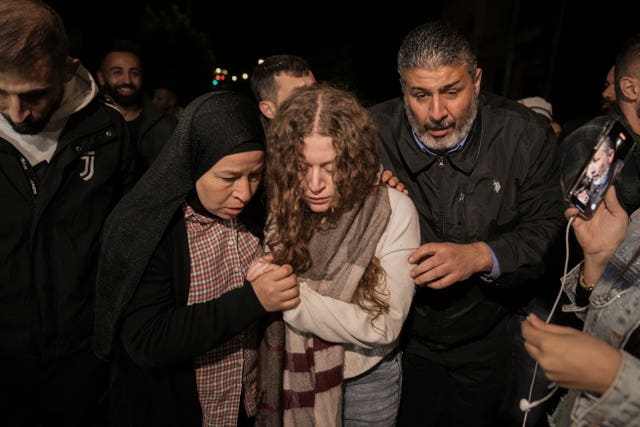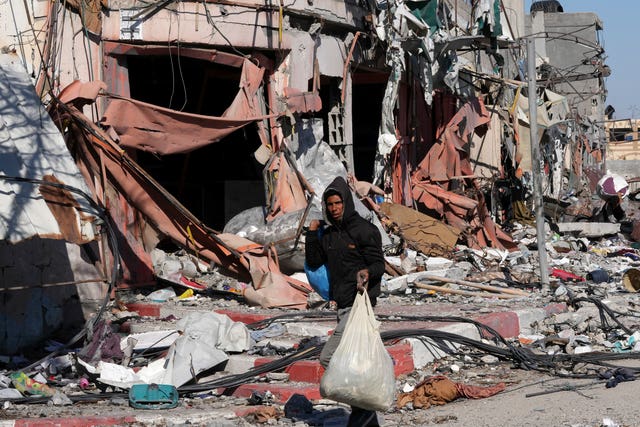Tough talks ahead as Gaza ceasefire holds with more hostages freed

There are tough talks ahead over any continuation of the ceasefire (AP)
Israel and Hamas agreed at the last minute on Thursday to extend their ceasefire in Gaza by another day to allow more hostages and prisoners to be released.
But any further renewal of the truce, now in its seventh day, could prove more daunting as Hamas is expected to set a higher price for many of the remaining hostages.
Hamas freed two Israeli women on Thursday afternoon and more hostage releases are expected to follow, the Israeli military said.

At least 10 Israelis a day, along with other nationals, have been released during the truce, in return for Israel’s release of at least 30 Palestinian prisoners.
International pressure has mounted for the truce to continue as long as possible after weeks of Israeli bombardment and a ground campaign following Hamas’ deadly October 7 attack on Israel that triggered the war.
Thousands of Palestinians in Gaza have been killed and more than three-quarters of the population of 2.3 million have been uprooted, leading to a humanitarian crisis.
Israel has vowed to resume the fighting – with the goal of dismantling Hamas – once the ceasefire ends.
The talks appear to be growing tougher, with Hamas having already freed most of the women and children it kidnapped on October 7.

The militants are expected to make greater demands in return for freeing scores of civilian men and soldiers.
US secretary of state Antony Blinken, who met with Israeli Prime Minister Benjamin Netanyahu and other top officials on his third visit to the region since the start of the war, said he hoped the ceasefire could be extended and more hostages could be released.
“This process is producing results. It’s important, and we hope that it can continue,” he said.
Qatar and Egypt, which have played a key role in mediating, are seeking to prolong the deal by another two days, according to Diaa Rashwan, the head of Egypt’s state information service.
On Thursday morning, Palestinian gunmen opened fire on people waiting for buses along a main highway entering Jerusalem, killing at least three people and wounding several others, according to Israeli police.
The two attackers, brothers from an area in annexed east Jerusalem, were killed.
After the attack, six other members of the family were detained, and the government ordered their house be demolished.
Hamas claimed responsibility for the attack, casting it as retaliation for the killing of women and children in Gaza and the occupied West Bank and other Israeli “crimes”.
The attack did not appear to threaten the truce in Gaza. But escalating violence – including Israeli raids – in the West Bank and east Jerusalem could blow back to wreck the quiet in Gaza, even though these areas are not covered under the ceasefire.
On Wednesday, Israeli troops killed two Palestinian boys during a raid in Jenin, according to Palestinian health officials. The Israeli military separately said the raid killed two Islamic Jihad militants.

Mr Netanyahu is under intense pressure from families of the hostages to bring them home. But his far-right governing partners are also pushing him to continue the war until Hamas is destroyed, and could abandon his coalition if he is seen as making too many concessions.
Israel says it will maintain the truce until Hamas stops releasing captives, at which point it will resume military operations aimed at eliminating the group, even as the Biden administration has urged it to operate with far greater precision if it does so.
An Israeli official involved in hostage negotiations said talks on a further extension for the release of civilian men and soldiers were still preliminary, and that a deal would not be considered until all the women and children are out.
The 210 Palestinians released, including at least seven Israeli Palestinians, have been women and teenagers. The teenagers were largely accused of throwing stones and firebombs during confrontations with Israeli forces.
A number of the women were detained for pro-Palestinian social media posts that Israeli authorities said constituted incitement of violence. Several were convicted by military courts of attempting to attack soldiers, some of them after being found carrying scissors or knives near security positions.
With Thursday’s releases, a total of 75 Israelis, including dual nationals, have been freed during the truce, most of whom appear physically well but shaken. Another 24 hostages – 23 Thais and one Filipino – have also been released, including several men.
Before the ceasefire, Hamas released four hostages, and the Israeli army rescued one. Two others were found dead in Gaza.
On Thursday, the military confirmed the death of Ofir Tzarfati, who was believed to be among the hostages, without providing any further details. The 27-year-old attended a music festival where at least 360 people were killed and several others were kidnapped on October 7.
Hamas and other Palestinian militants killed more than 1,200 people – mostly civilians – in their wide-ranging attack across southern Israel that day and took around 240 people captive. Authorities have only ever provided approximate figures.
Israel’s bombardment and ground invasion in Gaza have killed more than 13,300 Palestinians, roughly two-thirds of them women and minors, according to the health ministry in Hamas-ruled Gaza, which does not differentiate between civilians and combatants.
The toll is likely much higher, as officials have only sporadically updated the count since November 11. The ministry says thousands more people are feared dead under the rubble.
Israel says 77 of its soldiers have been killed in the ground offensive. It claims to have killed thousands of militants, without providing evidence.














